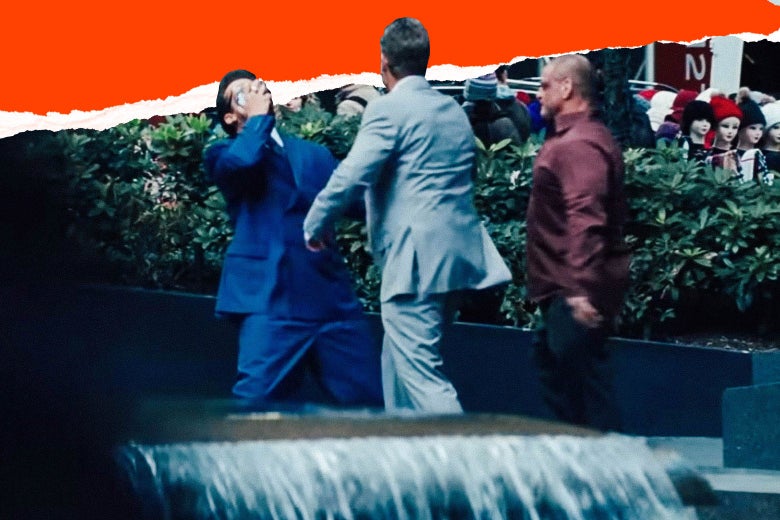
Photo illustration by Slate. Photo by A24.
In Slate’s annual Movie Club, film critic Dana Stevens emails with fellow critics—this year, Bilge Ebiri, Karen Han, and Alison Willmore—about the year in cinema. Read the first entry here. Read the previous dispatch in the series here.
Dear Karen, Dana, and Alison,
Dana, you ask about movies we feel a “moral calling to champion.” Zhang Yimou is one of the greatest filmmakers the world has ever known or will know, and the fact that he released a major picture this year that flew under the radar, even among film buffs, kind of enrages me, especially since Shadow was a magnificent, mesmerizing, breathtaking action epic—the kind of movie whose absence we’re always lamenting. It’s the tale of a body double (or “shadow”) who takes the place of a wounded commander in medieval China. Aided by that officer’s wife, the double learns to counter the enemy’s aggression with a more “feminine” style of fighting—one based on speed, lightness, and finesse.
The film is shot in a style reminiscent of Chinese inkbrush painting, with sweeping whites and blacks set against gray backdrops of mist, rock, and steel. And it starts off with quiet, meditative sequences that emphasize natural elements—the small spray of water off a weapon in the rain, the shudder of a bamboo pole vibrating upon impact—but eventually gives way to intense, intricate, gruesome scenes of combat. The final battle, involving an army wielding umbrellas made of retractable steel blades, is one of the coolest things I’ve seen in recent years. If I had lots of money, I would rent the biggest theater I could find and just sit there in the dark, watching Shadow for days on end.
But there’s underseen, and then there’s unseen. There, too, Zhang Yimou’s got everyone beat. Because he actually had another feature this year that completely vanished. The movie in question, One Second, is reportedly a drama set during China’s Cultural Revolution and “a love letter to cinema” (in Zhang’s words). Way back in February, its Berlin Film Festival screening was canceled at the last minute due to a “technical issue.”
The picture has still not appeared anywhere, so that technical issue was either Zhang’s editor accidentally hitting “delete” on the Final Cut Pro file, or the Chinese censors being royally pissed. (Zhang has dealt with the Cultural Revolution in his work before, in quite devastating fashion: 1994’s To Live got him banned from filmmaking for a couple of years, but 2014’s Coming Home didn’t cause him any trouble, as far as I can tell.)
Part of me wishes there were more of an uproar about this stateside, where we still claim to consider censorship a bad thing. But I also can’t exactly call Zhang Yimou a repressed artist because while all this is going on he also directs big, government-friendly live nationalist spectacles. But maybe that’s the cost of getting his movie released eventually. Either way, Zhang’s career is one of the most fascinating, complicated in cinema history, and I don’t understand why everyone else is not obsessed with him.
Alison and Karen, you discussed movies that were undone by a single misstep, or were somehow redeemed by one notable element. The one in the former category that I can’t shake is Edward Norton’s Motherless Brooklyn, an impeccably produced, years-in-the-making passion project that mostly falls apart because of—well, because of Edward Norton’s performance, frankly, which ironically is the reason the movie exists in the first place. Alison, your essay on how Norton (whom I nevertheless still consider one of my favorite actors) has made a career out of playing parts like this was excellent, and I can’t improve on your description of his performance in Motherless: “In the movie, Lionel becomes someone who succeeds despite his Tourette’s syndrome, which is realized only as a set of external markers, with Norton also sanding away a lot of the weirder, more distinctive aspects of the character’s personality.”
And now, I’m afraid we must get on to the more regrettable stage of our acquaintance, as they say in Barry Lyndon. A not-so-good movie with one great element? How about everybody’s beloved Uncut Gems, which, yes, has a fantastic Adam Sandler performance, but also sets off every single bullshit detector I have. I sense almost no recognizable human behavior in that film. The problem is clearly me: I had the same problem with the Safdie brothers’ previous effort, the similarly-wildly acclaimed-in-all-quarters Good Time, which as far as I’m concerned used all sorts of bogus narrative contrivances and character conveniences to build a highly implausible story that apparently everyone else found super-suspenseful and moving and entertaining. To me these movies feel like The House of Sand and Fog or another one of those phonily plotted mid-market melodramas; it’s just that the Safdies are so proficient with handheld urban grit that they’re better at masking all their manipulation. I did enjoy Uncut Gems’ final half-hour or so because Sandler is so good, as is Eric Bogosian, but yeah, no.
This is how I lose,
Bilge
from Slate Magazine https://ift.tt/35YtOE3
via IFTTT
沒有留言:
張貼留言